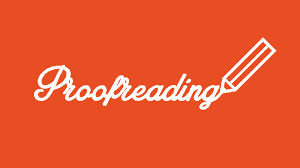- Home
- For Academics
- For Book Authors
- For Businesses
- Proofreading Resources
- About us
- English language blog
7-step guide to proofreading your own dissertation
7-step guide to proofreading your own essay/dissertation
Sometimes PhD and Master's students find themselves having to proofread their own dissertation/thesis or essay.
This could be because of a very limited budget and inability to pay a third-party professional thesis proofreading services provider. Others may be too worried to allow a third party access to their academic manuscript for confidentiality and privacy reasons.
A third category includes researchers and academics who have excellent writing skills and a full command of the English language and are highly capable of proofreading their own written essay or dissertation/thesis - although there is some argument that a writer can never see all their own mistakes.
Before explaining the specific steps that you should follow to proofread and review your own thesis, two aspects need to be clarified:
- What does proofreading mean in this article?
- Who can proofread their own work?
1. What is meant by proofreading?
Professionals often differentiate between proofreading and editing in order to avoid both editorial processes being mixed up. Definitions have varied, and so have views from language experts and specialists regarding the exact parameters of each.
There is, however, a general consensus that editing is a more critical, intensive examination of the text and involves significant intervention from the editor, while proofreading is more or less a final polish to ensure there are no errors in grammar, punctuation or spelling or in layout.
Having explained that, the two terms "proofreading" and "editing" are used interchangeably on a wide scale.In this article, we refer to proofreading as both processes: proofreading and editing. This is to avoid excessive repetition of the two words combination and to reflect the name most commonly used by students and academics to describe both editing and proofreading.
2. Who can really proofread their own work?
Providing practical tips to MA or PhD students to proofread their own essay or thesis/dissertation should not be taken as an open invitation for you to proofread and edit your own paper unless you are actually qualified enough to do so. Years of hard academic research work can be wasted because of bad academic writing and poor English.
So, whether you belong to the first, second, or third category of students wanting to proofread their own academic papers, you need to meet the following conditions:
- Excellent command of English language, in terms of punctuation, spelling and grammar usage
- Flawless academic writing skills
- An eye for detail and narrative
- Sufficient time
Now, let’s go into the particulars of how you can proofread your own thesis or essay:
1. Find a comfortable seat and read a print-out
It might be at your desk at home, on your sofa, or even in a Costa Coffee or Starbucks, but the very first thing you will need to do is to print out what you have written and take it somewhere quiet and read it from cover to cover, from the first letter to the last letter. Do not touch anything yet. All you need to do at first is to read your dissertation carefully as if it was drafted by someone else and you are interested in reading it from beginning to end.
2. Take general notes and observations
While doing the first read of the text, just jot down the most prominent points that caught your attention about it, for example: bad grammar, incorrect tense usage, unclear language, unsubstantiated claims or argument, inconsistency, a structural gap, ambiguous wording, or unnecessary repetition, etc. Your aim at this stage should not yet be to introduce any actual changes in the paper. The aim is to spot salient problems in your copy.
3. Print it out again
Once you have identified the initial issues and fixed them in the soft copy of your dissertation or essay on your computer, print it out again. At this point, you can start focusing on your written piece from a linguistic perspective, i.e correcting and improving your own written English, in terms of syntax, tone, style and flow.
4. Start with essentials
You now have a well-written dissertation (in terms of theme, sub-themes, development and coherence of ideas and argument, etc) and you are set to move to the next stage of proofreading your own work. It is advisable to start with the essential: correction of grammar, punctuation and spelling. Although your supervisor or evaluating professor may not be extremely upset if you express your ideas improperly, he or she will most likely be unhappy to find your thesis full of SPAG mistakes. At the very least, you should be able to submit a paper that is free of spelling, punctuation and grammatical errors. Do not forget to ensure you used American English if you are expected to write in American English, and that you used British English if you are expected to write in British English. Mixing up British and American English is definitely frowned upon by professors and university teaching staff.
5. Improvement and enhancement
Once you have gone through your academic paper and finished correcting all the essential errors and mistakes, it is time to put it aside. Sleep on it; just leave it and go and do something completely different. Go out for a walk or have a chat with a friend or even watch a movie. Then come back to your dissertation and essay with a fresh pair of eyes. Now read it from the point of view of an average reader. This will give you an idea about the areas in which you will now need to improve and enhance the language and delivery of ideas and sub-ideas within the piece of writing itself. Do not forget, you must read it aloud but with complete concentration (ensure no distractions around). This will help you spot the gaps and language issues that need to be fixed to ensure the essay or dissertation flows nicely throughout in clear, concise, idiomatic and academic language.
6. Check your references, in-text citations, formatting
MA and PhD student are expected to follow certain guidelines for referencing, and it is extremely important to ensure that you got those right, because when your paper is being marked, your marking professor or supervisor will take the referencing style and in-text citations into account. So, ensure you proofread and edit them correctly by studying the specific style guide related to your specific college or university. If in doubt, check with your supervisor and seek advice as to where you can find a good resource. Again, proofreading and editing the in-text citations and references used throughout your paper is crucial. Now it is time to ensure that you got another essential part of proofreading and editing – which is formatting – right. Again, you will be given or directed to specific guidelines on formatting, so it is a matter of ensuring you got your font size, margins, etc. correctly. Formatting is such an important aspect that professional academic proofreading services providers offer it (and charge for it) as a separate service from editing and proofreading services.
7. Final checks
Now you have a thesis that is free of grammatical, punctuation and spelling errors, a thesis that is written in proper British or American English, a thesis whose theme and sub-themes are laid out clearly and concisely, a thesis that flows nicely throughout, a thesis that has a correct referencing style, in-text citations and format.
It is now time for a final, calm and solid read of the entire dissertation, just in case anything has slipped your net throughout the previous stages of proofreading your own piece of writing.
Good luck with submitting a properly proofread and edited dissertation/thesis or essay.
The Ultimate Proofreader is a UK-based provider of thesis proofreading services.Dissertation Proofreading Services UK
Legal Proofreading Services
Book Proofreading Service


